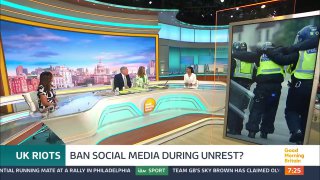TV hosts in the UK are currently engaged in a heated debate about the potential banning of social media during times of social unrest. The discussion stems from concerns about the spread of “inflammatory information” on these platforms and its role in escalating tensions within communities. The proposed measure is being framed as a way to “keep communities safe” by limiting the dissemination of harmful and provocative content.
The idea of restricting social media access during periods of turmoil is not new. In recent years, governments around the world have grappled with how to address the role of social media in exacerbating conflicts and inciting violence. While some argue that limiting access to these platforms can help prevent the spread of misinformation and prevent further unrest, others believe that such actions only serve to fuel anger and drive dissent underground.
Critics of the UK government’s proposal to ban social media during social unrest argue that it is a sign of desperation and a failure to address the root causes of the issues at hand. When people are already protesting and rioting in the streets, restricting access to social media may only serve to further enflame tensions and push individuals to find alternative, potentially more harmful, ways to communicate and organize.
Furthermore, there are concerns about the impact such a ban would have on freedom of speech and the ability of individuals to express their opinions and concerns online. Social media has become a powerful tool for marginalized groups to advocate for change and hold those in power accountable. Banning these platforms could silence important voices and prevent vital conversations from taking place.
As the debate over the potential banning of social media in the UK continues, it is clear that finding a balance between protecting public safety and upholding civil liberties is a complex and delicate issue. While it is important to address the spread of harmful content online, it is equally important to ensure that individuals have the ability to freely express themselves and engage in meaningful dialogue about the issues that affect their lives.

